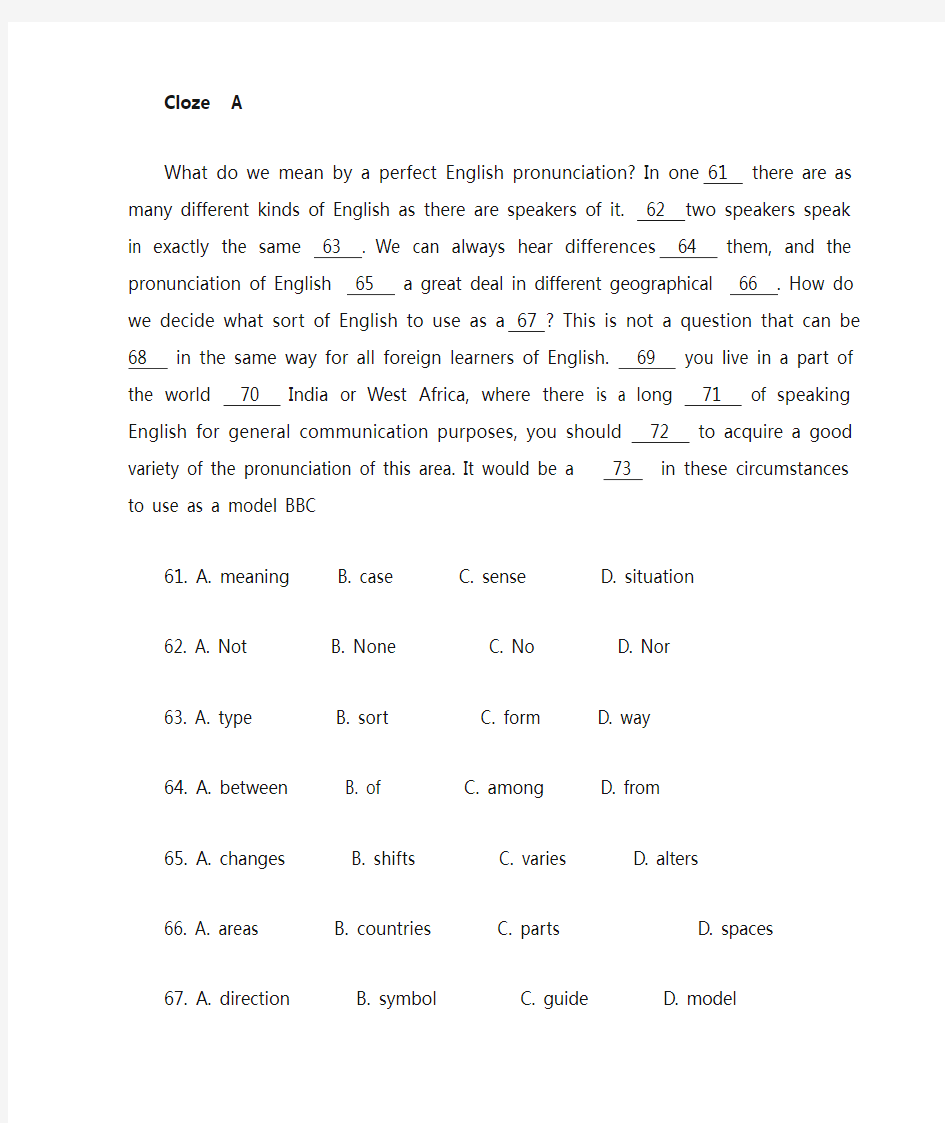专转本英语完形填空练习

- 1、下载文档前请自行甄别文档内容的完整性,平台不提供额外的编辑、内容补充、找答案等附加服务。
- 2、"仅部分预览"的文档,不可在线预览部分如存在完整性等问题,可反馈申请退款(可完整预览的文档不适用该条件!)。
- 3、如文档侵犯您的权益,请联系客服反馈,我们会尽快为您处理(人工客服工作时间:9:00-18:30)。
What do we mean by a perfect English pronunciation? In one 61 there are as many different kinds of English as there are speakers of it. 62 two speakers speak in exactly the same 63 . We can always hear differences 64 them, and the pronunciation of English 65 a great deal in different geographical 66 . How do we decide what sort of English to use as a 67 ? This is not a question that can be 68 in the same way for all foreign learners of English. 69 you live in a part of the world 70 India or West Africa, where there is a long 71 of speaking English for general communication purposes, you should 72 to acquire a good variety of the pronunciation of this area. It would be a 73 in these circumstances to use as a model BBC
61. A. meaning B. case C. sense D. situation
62. A. Not B. None C. No D. Nor
63. A. type B. sort C. form D. way
64. A. between B. of C. among D. from
65. A. changes B. shifts C. varies D. alters
66. A. areas B. countries C. parts D. spaces
67. A. direction B. symbol C. guide D. model
68. A. given B. satisfied C. responded D. answered
69. A. Because B. If C. When D. Whether
70. A . as B. like C. in D. near
71. A. custom B. tradition C. use D. habit
72. A. aim B. select C. propose D. tend
73. A. fashion B. nonsense C. mistake D. possibility
English or 74 of the sort, on the other hand, if you live in a country 75 there is no traditional use of English, you must take 76 your model some form of 77 English pronunciation. It does not 78 very much which form you choose. The most 79 take as your model the sort of English you can 80 most often.
74. A. everything B. anything C. nothing D. things
75. A. where B. which C. that D. wherever
76. A. to B. on C. with D. as
77. A. practical B. native C. domestic D. new
78. A. care B. trouble C. affect D. matter
79. A. effective B. ordinary C. sensitive D. efficient
80. A. listen B. sound C. hear D. listen to
If we view a science as a body of systematized knowledge, then chemistry is usually called a natural science because it 61 knowledge of the natural world. 62 we may wonder 63 there is no complete system 64 all of chemistry fits perfectly. Gaps in the present system, however, show that chemistry is still a 65 subject and that we 66 all of its facts, laws and theories. 67 , chemistry as a science is very much 68 us today, and its future holds the bright promise 69 much more to come.
61. A. is dealt with B. is connected C. is connected with D. deals
62. A. At time B. At times C. Sometime D. At any time
63. A. why B. where C. when D. how
64. A. which B. of which C. into which D. on which
65. A. interesting B. important C. necessary D. growing
66. A. didn't discover B. had not discovered C. haven't yet discovered D. haven't discovered
67. A. At the same time B. In the same way C. In other words D. By the way
68. A. with B. for C. to D. of
69. A. to B. of C. for D. in
Man's knowledge about himself and nature has grown into 70 sciences. The growth of the separate sciences 71 more developmental than intentional. The separation of the natural science into physical and biological sciences, and physical sciences into physics and chemistry, happily 72 a larger body of knowledge into more manageable parts. At the same time we 73 that the concepts, techniques, and applications of the various sciences are interdependent and not exclusively a part of one science or 74 , in this _75 ? chemistry is a key science 76 the natural sciences because everyone, 77 the area of natural science he wishes to pursue, 78 at least an introduction to the principles and simpler application of chemistry as a foundation for his speciality.
Chemistry deals with the 79 of matter, changes in matter, the laws and principles 80 changes, and the concepts and theories that interpret them.
70. A. a lot of B. a kind of C. a variety of D. a set of
71. A. was B. has been C. became D. have become
72. A. breaks down B. breaks off C. breaks out D. breaks up
73. A. should remember B. should remind C. should find D. should remain
74. A. the other B. the next C. one another D. another
75. A. way B. respect C. science D. time
76. A. between B. about C. among D. around
77. A. regardless of B. no matter how C. although D. even if
78. A. needs B. orders C. asks D. permits
79. A. quantities B. substance C. qualification D. properties
80. A. described B. showed C. describing D. showing
